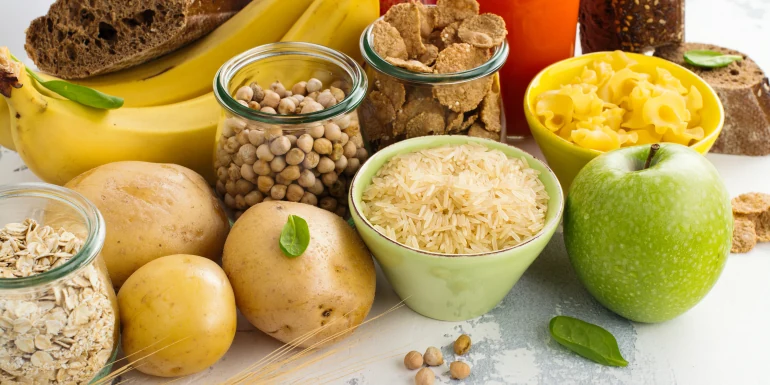
Minerals are essential – but how much do we need?
Minerals from chloride through to zinc help maintain body functions like the immune system. They come in the form of macro- and trace elements. Which minerals do we need and in what quantities?
The human body is not capable of producing minerals by itself. They are essential for maintaining vital functions, however, and thus need to be absorbed via our food.
All foods contain a certain amount of minerals. You should focus on natural foodstuffs – the less processed your food, the more minerals it will contain. Minerals can also be added. Foods with added minerals are known as fortified foodstuffs. Unlike vitamins, however, minerals cannot be produced synthetically. In contrast with vitamins, minerals are largely resistant to heat, light and oxygen – although they can be drawn out by water. This can happen when preparing, washing or cooking food.
Minerals can be divided into macro- and trace elements. Our bodies contain at least 50 mg of macroelements per kilogram of body weight, and slightly more for trace elements. These tiny amounts have a major impact on our health and physical performance.
Our health consultation advisors will show you how to achieve a balanced and nutritious diet.
An overview of key trace elements
Chromium
It wasn’t until the late 1950s that researchers discovered chromium was essential for the human body, as it helps us absorb glucose. This trace element is also involved in metabolising fat and cholesterol. The exact amount required has not yet been determined. The Swiss Society for Nutrition (SSN) assumes that 30–100 micrograms per day are sufficient. This is equivalent to 100 g of Brazil nuts or 500 g of blueberries.
Foods containing chromium include: wholegrain products, nuts, white beans, honey
Copper
Copper plays an important role in iron metabolism. A copper deficiency can cause anaemia, osteoporosis and problems with the nervous system. An adult’s recommended daily copper intake is 1–1.5 mg. This is equivalent to 100 g of dark chocolate or 30 g of cashew nuts.
Foods containing copper: oats, wholegrain products, nuts, soya beans
Fluoride
Most foods contain only a minimal amount of fluoride. This means the main source of fluoride in Switzerland is fluoridated salt. Fluoride helps prevent tooth decay. Women’s recommended daily intake is 3.1 mg; men’s is 3.8 mg. 3.8 mg is equivalent to 15 g of fluoridated salt.
Foods containing fluoride: fish, black tea, grains, mineral water
Iodine
Iodine plays a key role in human metabolism. Over half of the body’s iodine is stored in the thyroid. Iodine can be found in both animal- and plant-based foods. It is usually only found in very small amounts, however, which is why it is advisable to enrich your diet with iodised salt. Iodine deficiency leads to an enlarged thyroid, and can result in delayed growth and inhibited mental performance in children. An adult’s recommended daily iodine intake is 150 mg, which is equivalent to approximately 6 g of iodised table salt. Those who are pregnant or breastfeeding require significantly more, however, with a recommended daily intake of 250 mg. Insufficient iodine during pregnancy can negatively impact the foetus and cause lasting damage.
Foods containing iodine include: fish, seafood
Iron
Iron comes in two forms. Haem iron is mainly found in meat and fish, while non-haem iron is only found in plant-based foods. The body is able to absorb haem iron much more efficiently than non-haem iron. Iron is essential for transporting oxygen via the bloodstream. It also supports the immune system. As a result, an iron deficiency will compromise the immune system and the body’s physical performance. Women need 15 mg of iron a day; men need only 10 mg. This is equivalent to 125 g of dried lentils or 400 g of wholemeal bread, for example. Food that is rich in vitamin C, such as oranges and broccoli, helps your body to absorb iron. Coffee and red wine, on the other hand, inhibit iron absorption.
Foods containing iron include: beef, white beans, oats, peas
Manganese
Scientists are still investigating exactly what manganese does in the body. What we do know is that manganese activates enzymes and helps build and break down carbohydrates, amino acids and cholesterol. It also contributes to energy metabolism and promotes bone and cartilage growth. The recommended daily intake is thought to be around 2–5 micrograms. This is equivalent to 50 g of oats or 200 g of spinach.
Foods containing manganese include: wholegrain products, bananas, nuts, black tea
Molybdenum
This trace element can be found in many foods. Deficiencies generally only occur in patients who require artificial feeding for an extended period. Molybdenum is involved in metabolising uric acid and in breaking down hormones such as adrenaline. The SSN estimates a daily recommended intake of 50–100 mg; 100 mg is equivalent to 70 g of oats or 43 g of peanuts.
Food containing molybdenum: pulses, cauliflower, wholegrain products
Selenium
The amount of selenium in any given food greatly depends on the selenium content of the soil and the animal feed. The soil in Switzerland has a low selenium content, and so do our grains as a result. However, selenium deficiency is rare. Selenium protects the body’s cells against the damaging effects of free radicals, plays an important role in our cellular metabolism and promotes the activation of thyroid hormones. Men have a recommended daily intake of 70 mg, which is equivalent to 350 g of raw egg pasta. Women require slightly less, with a recommended daily intake of 60 mg.
Foods containing selenium include: herring, chicken, corn, oats
Zinc
Zinc is essential for the immune system and helps us to store insulin. Zinc is also integral to many enzymes, hormones and receptors, or helps to activate them. A zinc deficiency can lead to loss of appetite, hair loss and slow tissue repair. An important factor in zinc absorption is phytic acid, which inhibits the absorption of zinc by the intestines. Your recommended daily intake of zinc therefore depends on your phytic acid intake. Phytic acid is chiefly found in wholegrain products and plant-based proteins. Anyone who consumes these in large quantities will also need to consume more zinc.
Foods containing zinc include: beef, oats, corn, peas
As with minerals, the body is unable to produce most vitamins by itself. Find out more about what the various vitamins do and how much of them we should be consuming each day.
An overview of macroelements
Calcium
Calcium can be found in animal- and plant-based foods. The main sources are dairy products and some mineral waters. Calcium is a key component in bones and teeth. It helps stabilise cell membranes, aids in the transmission of nerve impulses and is essential for blood clotting. A calcium deficiency can cause delayed growth in children. In adults, it can cause osteomalacia and osteoporosis. Adults require 1,000 mg of calcium a day. This is equivalent to 100 g of Emmental cheese or 850 ml of whole milk.
Foods containing calcium: milk, dairy products, hard cheese, nuts, wholegrain products, mineral water
Chloride
Chloride is most commonly found in conjunction with sodium. Our main source of chloride is salt. Chloride ensures electrical impulses are transmitted, thereby promoting communication between cells and nerves. It also aids digestion and protects the body from pathogens. The daily recommended intake for adults is approximately 2.3 g and is usually supplied by a normal diet. This is equivalent to 3.8 g of table salt or 175 g of bread.
Phosphorus
Phosphorus is needed to build bones and teeth. It is also involved in the energy metabolism process. Deficiencies are very rare, as almost all foods contain phosphorus. The recommended daily intake for adults is 700 mg, which is equivalent to 117 g of full-fat Gruyère cheese or 313 g of wholemeal bread.
Magnesium
Magnesium serves a variety of purposes. It supports transmission of nerve impulses and helps regulate muscle contractions, is required for growing bones and teeth, and activates important enzymes involved in energy metabolism. Magnesium is found in our bones and muscles. Magnesium deficiencies are rare in people who eat a healthy diet. They can be caused by habitual alcohol consumption, long-term use of some medications and gastrointestinal diseases. People suffering from a magnesium deficiency tend to experience muscle cramps and problems with their heart and skeletal muscles. Men’s recommended daily intake is higher than women’s: adult males require 350 mg a day, while women need just 300 mg. 350 mg is equivalent to 300 g of oats.
Foods containing magnesium: green vegetables, potatoes, nuts, fruit, milk
Potassium
Potassium makes cells grow and contributes to nerve impulse conduction and muscle contraction. Alongside sodium, potassium helps regulate the body’s fluid and acid-base balance. High potassium levels also have a positive effect on blood pressure. Potassium deficiencies are very rare, but can be caused by prolonged diarrhoea or vomiting. Common symptoms include muscle weakness, cardiac arrhythmia and intestinal paralysis. The recommended daily potassium intake for adults is 4 g. This is equivalent to 159 g of dried green beans.
Foods containing potassium: bananas, dried fruit, mushrooms, potatoes, pulses
Sodium
Sodium is a key component of salt. It is almost entirely absorbed by the small intestine. Sodium helps regulate the body’s fluid balance, the pressure in our cells and the acid-base balance. Sodium deficiencies are rare, but can be caused by prolonged diarrhoea, vomiting or heavy sweating. The recommended daily sodium intake for adults is 1.5 g. This is equivalent to 3.8 g of table salt or 238 g of brown bread.
Foods containing sodium: salty foods
How to achieve a mineral-rich diet
You will normally meet your recommended daily mineral intake simply by eating a balanced and varied diet. When it comes to a mineral-rich diet, the less processed your food, the better. Ready meals and fast food contain almost no minerals. The same is true of bread, cake and pasta made from white flour (refined flour). Dietary supplements and mineral supplements are not normally necessary. You should only take these in consultation with your doctor and if you have a diagnosed deficiency.

The expert in this field provided the editorial team with advice and input for this article. Eliane Wyss (medical assistant and nutrition coach) works in the Helsana health consultation service. She supports customers on questions to do with nutrition and other health topics.



Newsletter
Find out more about current health issues every month and get all the information you need about our attractive offers from all Helsana Group companies * delivered by e-mail to read whenever it suits you. Our newsletter is free of charge and you can sign up here:
We did not receive your information. Please try again later.
* The Helsana Group comprises Helsana Insurance Company Ltd, Helsana Supplementary Insurances Ltd and Helsana Accidents Ltd.